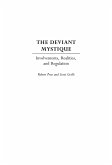As America experiences the growing pains associated with the rapid social changes in the economy, technology, and culture, various groups must develop coping mechanisms to help them deal with the anxiety that is brought on by such changes. Generation Xers, on the cutting edge of these changes, are no exception. More so than any other group, elite Xers, those who are succeeding in the new economy, have adopted a unique personality style, chameleonism, as a defense mechanism. People with a chameleon personality pretend to be what others want them to be in an effort to obtain for themselves the kind of security Xers feel previous generations have enjoyed, but which may not be available to their own generation. Rosen further argues that this personality component, of pretending to be something one is not, becomes a permanent part of the personality when it is practiced and used frequently enough. This riveting examination of the Xer generation sheds new light on the survival mechanisms employed by those who feel threatened by social changes, even as they participate in and benefit from them. The author begins by providing a careful explanation of the chameleon personality before delving into the special problems and obstacles (both real and perceived) that torment elite Xers, and their ways of dealing with these issues. He discusses various sources of anxiety and how the chameleon personality comes into play with regard to conflict between generations, conflict between the genders, and conflict brought on by immigration and foreign competition. While Rosen's approach is primarily socio-psychological, he also provides historical background on issues of social change and other attempts at dealing with it in the past. He presents a reasoned examination of the chameleon personality as it is manifested in America's Generation X in an effort to shed light on this unique segment of our population.
Bitte wählen Sie Ihr Anliegen aus.
Rechnungen
Retourenschein anfordern
Bestellstatus
Storno









